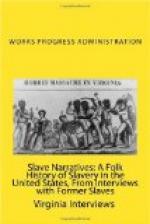Aunt Kate as she is generally called is a small black negro and in going into her home you will find it furnished in lovely antique furniture in a disreputable state of repair. She met me with a dignity and grace that would be a credit to any one of the white race to copy, illiterate though she may be. Her culture and training goes back to the old Buckner family, at one time one of the most cultured families in Christian County. She is not a superstitious negro. Being born a Buckner slave, she was never sold and her manners and ways proclaim that she surely must have been raised in “De white folks house” as she claims, being a maid when old enough, to one of Frank Buckner’s daughters. She stated, “Dese Buckners war sho good to me, eben now dey chilluns comes to see me and always bring me something. Dey don let my taxes lapse am I’se neber widout somting to eat.” My man and I was married by Mr. Alexander at McClain College. I was de cook an he was the janitor. My man followed his Massa in de Secess War. If he was a livin’ now he would be 110 years old, he bin ded ’round fifteen year.”
No I’se done believe in no ghosts hants or anything of that kind my white folks being “quality”. I’se been raised by “quality”! Why I’se “quality nigger”. “Wen any of my folks git sick or eny of my white folks de doctor would always bee sent foh.” (Her address is: R.R. #2, Hopkinsville, Ky.)
Nannie Eaves:
Nannie Eaves, age 91, born in McLain County, Ky. being a slave of William Eaves, never sold, address now R.R. #2, Hopkinsville, Kentucky.
“I guess I was about twenty one years old wen I was freed.” I’se was neber once treated as a slave cause my Massa was my very own Daddy. Ben Eaves my husband was a slave en chile of George Eaves my Massa’s brother. He ran away from his Massa en his Daddy en jins the U.S. Army during the Secess War en I’se now drawing a pension from Uncle Sam. I’se sho glad dat he had sense nuff ter go dis way or I’d be jes like dese old niggers dat is now on de Government.
“Course I never sweep de trash out de house after sun down jest sweep hit in de corner of de room cause hit is bad luck ter sweep out de door after dark. Lawd yes squeech owls en dogs howling under de house shi God means dar is going ter be a death in de family. Wen I hears one I’se git trembly all ober, hit makes me hot en den cold both de same time.”
“Ho I haint neber seed a ghost or hant but I sho don wanter see one neither. I’se always fraid I will seed one. Sho de dead can hant you if war not good to dem wen dey is livin’. Signs en sech things is going out of style now but Lor wen I was a chile why seems like things war better cause of dem.”
Nannie is a tall bright negro holding herself very straight, with real white long hair. Her hair is very fine and wavy. Her cabin home was immaculate, furnished very neatly in the now prevailing style.
Slave Trades: “We had two slave traders in this town. They were Judge Houston and his son-in-law, Dr. Brady. They gathered up all the slaves that were unrully or that people wanted to trade and housed them in an old barn until they had enough to take to New Orleans on a boat. They traded them down there for work in the cotton fields.




